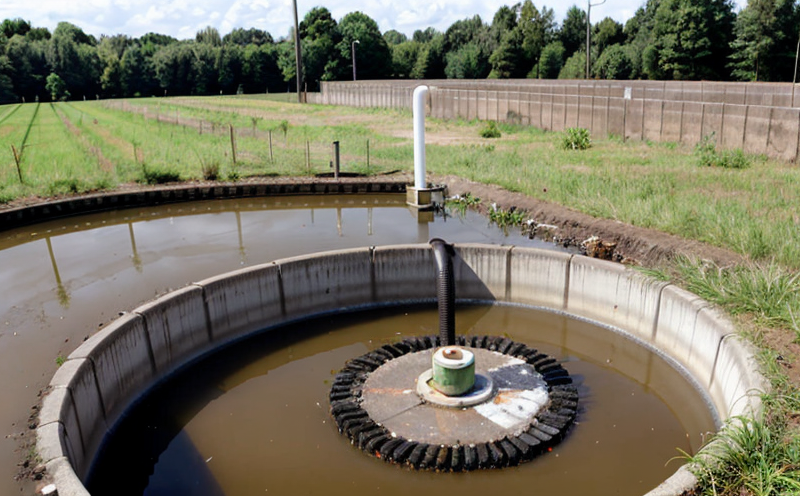Wastewater & Effluent Testing
In today's regulatory landscape, ensuring compliance with environmental standards is paramount. Wastewater and effluent testing plays a critical role in safeguarding the environment while maintaining industrial and municipal processes within acceptable limits.
The quality of wastewater and effluent directly impacts public health, aquatic life, and ecosystems. This service ensures that all discharges meet stringent local, national, and international standards such as ISO 14025 for environmental calibration laboratories and ASTM D7899 for the determination of total organic carbon in water by high-resolution mass spectrometry.
Our expertise lies in providing comprehensive testing solutions tailored to your specific needs. From identifying contaminants like heavy metals, pathogens, and chemicals down to trace levels, we offer a range of services that include but are not limited to pH measurement, dissolved oxygen analysis, biochemical oxygen demand (BOD) assessment, and total suspended solids determination.
For industries involved in manufacturing, mining, wastewater treatment plants, and municipal water systems, reliable data is essential for operational efficiency and regulatory compliance. Our laboratory adheres strictly to methodologies outlined by agencies like the U.S. Environmental Protection Agency (EPA), the Canadian Environmental Protection Act (CEPA), and the European Union's Water Framework Directive.
The scope of our testing extends beyond mere compliance; it encompasses a holistic approach that considers both immediate operational needs and long-term environmental sustainability. By leveraging advanced analytical techniques and cutting-edge instrumentation, we deliver accurate results that inform decision-making processes at various stages—from initial design phases to ongoing maintenance activities.
Our commitment to quality is reflected in our adherence to ISO/IEC 17025 accreditation standards, which ensure the accuracy, precision, and reliability of all test methods. This includes rigorous internal audits conducted by certified personnel who are experts in their respective fields. Additionally, we maintain up-to-date knowledge through continuous training programs aimed at staying abreast of technological advancements and changes in regulatory frameworks.
Understanding that every client has unique requirements regarding sample preparation, processing, and analysis, our team works closely with each customer to tailor testing protocols accordingly. Whether it involves complex matrix samples or simple routine checks, we strive to deliver consistent, high-quality results that meet expectations set forth by clients across diverse sectors including pharmaceuticals, electronics manufacturing, food & beverage processing, construction materials production, among others.
Scope and Methodology
- Contaminant Analysis: Detection of heavy metals (e.g., lead, mercury), organic compounds (such as BTEX), pesticides, pharmaceuticals, and other hazardous substances.
- Biochemical Oxygen Demand (BOD): Measurement of oxygen required by microorganisms to degrade organic matter in water over a specified time period.
- Total Suspended Solids (TSS): Quantification of particles suspended in water that can interfere with treatment processes or cause ecological harm when released into receiving waters.
- pH Measurement: Determination of acidity or basicity of wastewater to assess potential corrosion risks and microbial activity.
Industry Applications
The importance of wastewater and effluent testing cannot be overstated, particularly for industries where water quality significantly affects both internal operations and external environments. Here are some key applications:
- Municipal Wastewater Treatment Plants: Regular monitoring helps optimize treatment processes, reduce discharge impacts on natural bodies of water, and comply with stringent effluent limits.
- Pharmaceutical Manufacturing: Ensuring compliance with strict regulations regarding the presence of trace amounts of active ingredients or byproducts in final effluents.
- Electronics Manufacturing: Preventing contamination of waterways from etching solutions, solvents, and other chemicals used during production processes.
- Food & Beverage Processing: Minimizing the risk of introducing harmful pathogens or chemical residues into public drinking supplies.
Quality and Reliability Assurance
To maintain high standards of quality and reliability, our laboratory employs a robust Quality Management System (QMS) certified to ISO/IEC 17025. This system encompasses:
- Internal audits conducted by qualified personnel.
- Continuous improvement initiatives driven by feedback from clients and staff.
- Regular calibration of equipment using traceable standards.
- Employee training programs focused on maintaining expertise in current testing methodologies.





